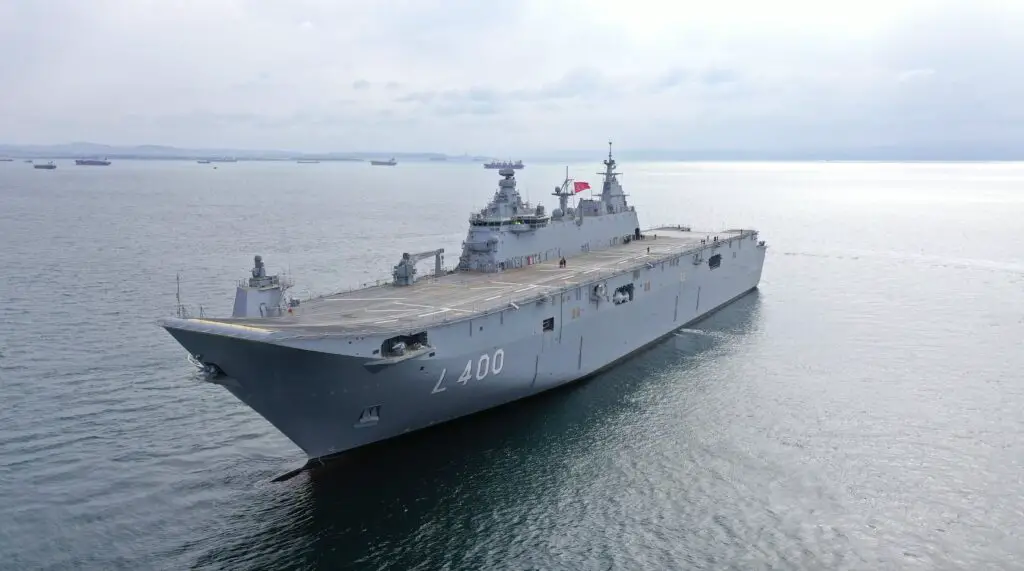Turkish Navy commissioned its long-anticipated largest warship, bolstering its naval capabilities and making the country one of the few nations in the world with a domestically built aircraft carrier. More than Türkiye’s first aircraft carrier, the ship will also be the world’s first vessel with an air wing mainly consisting of unmanned aircraft. Based on Spain’s flagship, the Juan Carlos I, Anadolu (L-400) is an amphibious assault ship of the Turkish Navy that can be configured as a V/STOL aircraft carrier. It is named after the peninsula of Anatolia (Turkish: Anadolu) which forms the majority of the land mass of Turkey. The construction works began on 30 April 2016 at the shipyard of Sedef Shipbuilding Inc. in Istanbul, with the keel being laid on 7 February 2018.
The Sedef–Navantia consortium won the tender for the amphibious assault ship project of the Turkish Navy and Anadolu used the same design as that of the Spanish ship Juan Carlos I. The final contract for the construction of the ship was signed with the Navantia-Sedef consortium on 7 May 2015. Navantia provided design, technology transfer, equipment and technical assistance to Sedef Shipyard of Turkey for the design and development of Anadolu. All of the ship’s weapon systems were procured by Turkish firms Aselsan and Havelsan. The ship features a Turkish combat management system, namely the GENESIS-ADVENT, which was integrated by Aselsan and Havelsan. Aircraft landing is assisted in all weather condition by Leonardo SPN-720 Precision Approach Radar.

According to the original plan, the Turkish Navy wanted a slightly shorter flight deck to be optimized for use with only helicopters. The Turkish Navy later changed its plan and opted for a fully equipped flight deck with the ski-jump ramp in front, after deciding to purchase F-35B STOVL aircraft. Turkey was a Level 3 partner in the Joint Strike Fighter program that led to the F-35 Lightning II, and the Turkish Air Force was intending to get the F-35A CTOL version until the U.S. Senate blocked the export of the fighter jet to Turkey due to its purchase of the S-400 missile system from Russia, which is subjected to CAATSA sanctions. Instead of the F-35B STOVL version, in the short term the Turkish Navy will operate domestically-produced UCAVs such as the Bayraktar TB3.
The dimensions of the final design are 231 meters (757 ft 10 in) in length, a 32-meter (105 ft 0 in) beam, a 6.8-meter (22 ft 4 in) draft, and 58 meters (190 ft 3 in) in height. Its displacement will be 24,660 tons in “V/STOL aircraft carrier” mission configuration; or 27,079 tons in “amphibious assault ship” mission configuration. Its maximum speed will be 21.5 knots (39.8 km/h; 24.7 mph) in “STOVL aircraft carrier” configuration; or 29 knots (54 km/h; 33 mph) in “amphibious assault ship” configuration. Its maximum range will be 9,000 nautical miles (17,000 km; 10,000 mi) at economical speed. The ship can carry up to 25 medium-sized helicopters. Alternatively, the ship can carry up to 10 F-35B STOVL fighter jets and 12 medium-sized helicopters.
Mavi Vatan, Mavi Gökyüzü!
Milli ve özgün ürünlerimiz #BayraktarTB3 ve Bayraktar #KIZILELMA, dünyan?n ilk S?HA gemisi #TCGAnadolu'nun uçu? güvertesinde!#MilliTeknolojiHamlesi ? ??#BayraktarTB3 ve Bayraktar #KIZILELMA are on the flight deck of #TCGAnadolu, world's first UCAV… pic.twitter.com/R8UDPDbn7U
— Selçuk Bayraktar (@Selcuk) April 10, 2023











